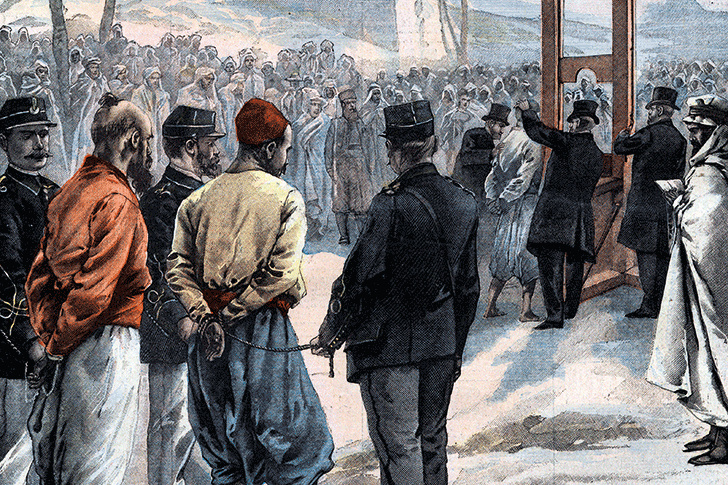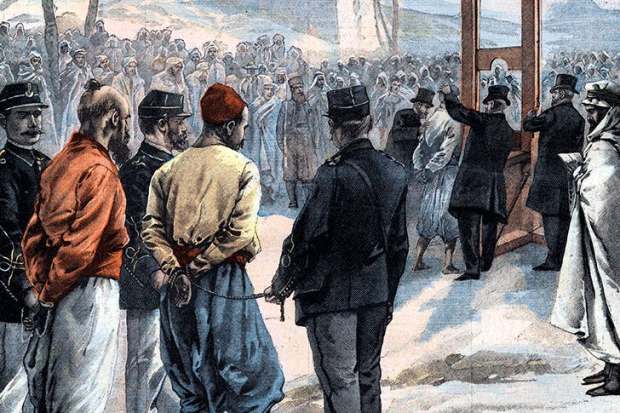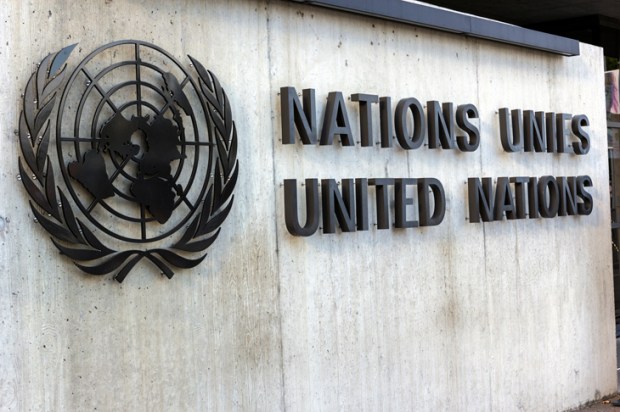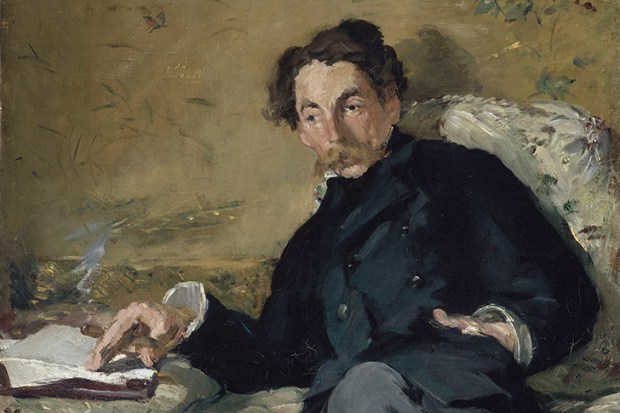Empires in the Sun might conjure up romantic visions for some, but this book’s essence is distilled in its subtitle, ‘The Struggle for the Mastery of Africa’. Lawrence James’s panoramic survey of imperial and then neo-colonial subjugation of the African continent between 1830 and 1990 is a timely reminder, if any were needed, of the devastating consequences of chauvinistic nationalism and expansionism. Violence, inflicted on a continent wracked by the slave trade, internal wars and epidemics, is the dominant theme: empire-building is always brutal.
France’s conquest and settlement of Algeria, the first European colony in Africa in modern times, sets the scene. Between 1830 and 1875, an estimated 875,000 Algerians were killed, approximately one third of the total population. A similar number are believed to have died in the famines of 1867 and 1868, disasters exacerbated by land seizures. Meanwhile, 385,000 European settlers had arrived by 1881. Pursuit of La Gloire by a nation desperate in the mid-19th century to avoid ‘sinking to the level of Romania or Greece’ was, we are told, ‘far more than just an exercise in national and dynastic vanity. Its ultimate and astonishingly ambitious objective was to absorb Algeria into France, and to fill it with European colonists.’
The other horrors of the competitive ‘scramble for Africa’ by European powers are also evenly recounted. There is no need for sensationalism: the facts about what happened in the Congo due to the ambitions of King Leopold II of Belgium, to the Herero and Nama in German South-West Africa (and simultaneously to hundreds of thousands in German East Africa, though the Maji-Maji rebellion and its consequences are not mentioned), and to those corralled into British internment camps during the South African (or ‘Boer’) war of 1899–1902 speak for themselves. It is a moot point whether any distinction can or should be drawn regarding the intentions behind such atrocities or their magnitude. The consequences of callous indifference, extermination orders and bumbling incompetence were the same.
The European powers were strikingly adept at engineering a casus belli, usually with a moral cloak, in pursuit of self-interest, territory and financial gain. But sometimes ends could be achieved by less bloody means. In 1882, Britain seized control of Egypt by ‘rescuing’ Africa’s success story of the time from bankruptcy with what James describes as ‘either a consummate political masterstroke or a sordid act of chicanery justified by breathtaking humbug’.
After the first world war, which marked the end of the first phase of imperial conquest, and in which two million Africans served and hundreds of thousands died, there was little respite. Spain dropped 13,000 gas bombs to ‘pacify’ the Rif towns in Morocco between 1923 and 1925. Italy used equally horrific methods in Libya and Abyssinia. After the second world war, some ‘bad men did many bad things’ in Kenya during the Mau Mau Emergency in the 1950s; and in Algeria, among a total population of ten million, as many as one million Arabs were killed and two million were interned as France fought the FLN in a ruthless campaign, in part civil war, to keep the country ‘French’. Amid the high hopes of the independence era, a new scramble was already under way. ‘The coincidence of decolonisation and the Cold War was a catastrophe for Africa,’ James rightly asserts, creating a pernicious ‘chain of dependency’.
While brutality is the ever-present backdrop to the narrative, as it was in Europe for most of the period, this book is not simply a catalogue of violence. James also scrutinises the deeply embedded economic and social consequences of the slave trade; the racist ‘fairy stories’, ‘cockeyed notions’ of ‘civilising missions’ and strategic objectives that underpinned European expansionism, subjugation and exploitation; the ‘profoundly disruptive force’ of Christianity; the emergence of nationalism; and much else besides. There is a fascinating, in parts alarming, chapter on the impact of Africa on Europe and much of interest about the domestic opposition to imperialism (on various grounds and at various times) in some countries, particularly Britain.
Lawrence James’s feat in distilling 160 years of history into just 329 pages is remarkable. Those familiar with his distinguished backlist will be reassured to know that he writes as well as ever and is a sure-footed guide. The narrative is concise, occasionally a little too concise, and judiciously leavened with entertaining anecdotes and a humorous turn of phrase. General Sir George Colley is described as ‘an even greater muff’ than his predecessor Lord Chelmsford.
This is not to suggest that James ever makes light of his subject matter. Africanists may quibble about the source material — only about five per cent of the items listed in the extensive bibliography are by contemporary African historians — but there is no dearth of African voices in what is clearly intended as a Euro-centric account for the general reader, whether European or African. A new pan-African survey of resistance, rebellion and adaptation in the same timeframe by an African historian would be a valuable complement.
The real merit of Empires in the Sun lies in its accessibility. Too much of what is recounted was ‘banished to historic oblivion’ until quite recently; beyond academia, too much remains conveniently forgotten or swept under the carpet. All foreign powers prefer to recall selectively their ‘empires in the sun’ rather than confront the messy details about how they mastered or manipulated them. Leaving aside the contentious issues of apologies, reparations and certain positive legacies, the business of establishing mastery needs to be much more widely known and acknowledged. There are valuable lessons to be learned and the facts are indispensable for anyone seeking to understand contemporary Africa.
The narrative is also important because after describing the end of apartheid in South Africa in 1994, James’s closing words — ‘henceforward Africans everywhere were in charge of their own affairs’ — are not strictly true. Certainly, all countries were ruled by non-whites. But foreign intervention in myriad, powerful forms persists throughout the continent. While this is seldom lethal and sometimes demonstrably beneficial, there is still a great deal going on — overtly and covertly — that is no less self-interested, pernicious and undermining than in days gone by.
Got something to add? Join the discussion and comment below.
Get 10 issues for just $10
Subscribe to The Spectator Australia today for the next 10 magazine issues, plus full online access, for just $10.
You might disagree with half of it, but you’ll enjoy reading all of it. Try your first month for free, then just $2 a week for the remainder of your first year.














Comments
Don't miss out
Join the conversation with other Spectator Australia readers. Subscribe to leave a comment.
SUBSCRIBEAlready a subscriber? Log in